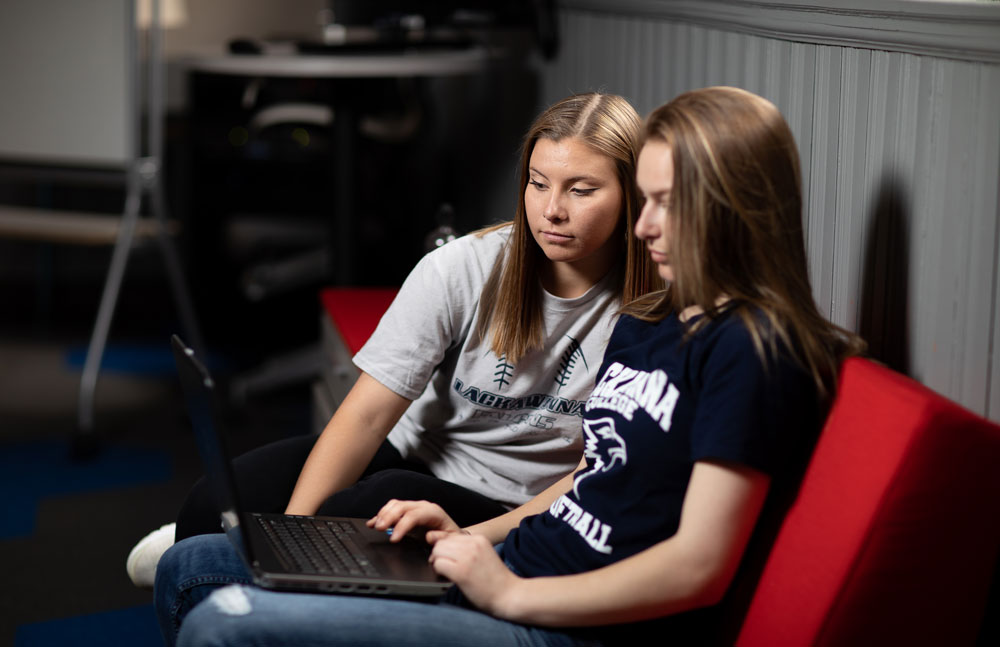Lackawanna College has long understood the burden that private loans can place on students, their families, and their future successes.
That’s why we’ve introduced the Lackawanna Shares Income Share Agreement (ISA) as an innovative option to help make school more affordable for our students. Currently, ISAs are available for qualified students in select majors that meet the College’s GPA requirements.
This isn’t a grant or a traditional loan, even though students will make payments after they graduate and secure employment.
It’s an opportunity to complete your education without worrying about interest rates or decades of student loan payments.

Providing a Potentially Less Expensive Option
Lackawanna Shares is a potentially less expensive funding alternative to private and Parent PLUS loans for students who need additional funding. ISAs provide some consumer protections that other forms of financing may not.
Students receive funding and complete their agreement by paying back a set percentage of their post-education salary over an established number of years.
One of the ways that an ISA differs from a traditional loan is that students aren’t paying interest on the total amount funded.

How Long Does it Take to Pay Back an ISA?
The standard payment period for the Lackawanna Shares ISA agreement is about 5 years, making it much shorter than most federal and private loan terms. In addition, all students receive a 6-month grace period post-graduation before payments begin. Once a recipient makes successful payments for the prescribed term of the contract, no additional payments are required even if they have paid less than the amount of funding they received.
Frequently Asked Questions
What is an Income Share Agreement?
In general terms, an Income Share Agreement, or ISA, is a contractual agreement in which a student receives education funding in exchange for sharing an agreed-upon percentage of their post-graduation income over a defined number of years.
Why is Lackawanna offering an ISA?
Lackawanna College is offering an Income Share Agreement to fight back against student loan debt, and challenge the status quo of the education industry. By offering an ISA, high-quality education becomes more accessible to those who may be unable to receive other forms of financing and reduces the risk a student takes by pursuing an education.
Is the Lackawanna Shares ISA meant to replace student loans?
The ISA helps support the cost of tuition for multiple specialty degree programs, but it does not cover other expenses incurred during the course of a student’s education, like transportation, living expenses, or personal study materials such as notebooks, laptop, etc. An ISA is meant to replace private student loans with respect to tuition only.
What are the benefits to students?
ISAs offer students an alternative to traditional debt, which creates substantial risks to students if they cannot afford their payments during and after the program, so ISA payments adjust according to levels of income and begin after the program is completed. In addition, the ISA program includes many consumer protections, including the ability to delay or defer payments if a student’s income is below a monthly threshold.
Am I required to fully pay the money that was given to me under the ISA?
An ISA recipient is simply required to pay the agreed upon percentage of post-completion earned income for the prescribed term of the contract, regardless of whether they end up paying more or less than the amount the received up front. And those who earn more than their peers will never have to pay more than the payment cap amounts.
What are the ISA payment stipulations?
ISA payments are only in months in which a student’s income is at or above $1,666.67, equivalent to an annual salary of $20,000. Monthly payments will be a portion of the ISA participant’s monthly income for 60 months, or until the tuition cap is reached, whichever occurs first. The percentage of a participant’s monthly income required to fulfill their ISA payment will depend on the amount of funding they initially received, among other factors. All terms are disclosed with the student before they complete their ISA.
What happens if my income falls below $1,666.67 per month?
The student may request a deferral and no payments will be owed if the student either:
- has enrolled at least full-time in higher education or training;
- earns less than or equal to $1,666.66/month (equivalent to $20,000/year);
- is unemployed;
- or is not in the labor force.
We may extend the payment term by one month for each month of deferment, up to an additional twenty-four (24) months.
May I exit or satisfy my ISA early?
If you desire to fulfill your obligations under this ISA prior to the expiration of your payment term, you may at any time pay an amount equal to the payment cap, less any monthly payments you have already made, plus any outstanding fees, as satisfaction-in-full of your payment obligations under this agreement. In addition, the sum of the total payments you owe under this agreement will not exceed the payment cap, plus fees described in the disclosures, regardless of your earned income. A prepayment option is available for consumer convenience, but there are no financial or other benefits whatsoever to students who pay off their ISA early.
Will the amount I am responsible to pay grow through interest expense until I begin making payments or by my occasional underpayment?
An ISA is not a loan and is not subject to interest expense. Beyond the cost of tuition, the only additional expenses a student may incur are associated with late payments (not to exceed $5) or returned payment/check fees ($25).
What are the risks to students?
The total payment amount is capped at two (2) times the up-front funding you receive, even if you earn a high income after graduation. This may provide a risk to students who are among the highest income earners and may be more expensive than taking out an interest-bearing student loan. The only other risk that you face is if you do not fulfill your obligation to provide up-to-date income information or to make payments based on that income. If that occurs, your account will become delinquent and may eventually go into default.
What is the cap on total ISA payments?
The cap on total ISA payments is two (2) times the up-front funding or credit you receive, plus any fees that are assessed associated with late or returned payments. A student will not make payments after reaching their cap, even if they’ve made less than 60 monthly payments.
Following graduation, when does the Lackawanna ISA payment plan take effect?
Upon completing or exiting the program, students are given a 6-month grace period to find a job and settle into their career. Payment will begin on the first day of the month following the 6-month grace period.
How do ISA payments work?
Monthly payments are calculated by applying your income share to your total monthly earned income, and that amount is sent to you in a monthly bill. Your earned income includes two things:
- your wages, salary, tips, and all other earned income that you report on line 7 of IRS tax form 1040 or line 1 of IRS tax form 1040-EZ, and
- your business income that you report on line 12 of IRS tax form 1040.
You can then pay online or with a check. Payments pause if you return to school, lose your job, or have a monthly income below $1,666.67, which is equivalent to $20,000 per year.
What documents do I have to sign?
After determining your eligibility, you will sign an Income Share Agreement, which includes a disclosure and additional contract terms and explanations. When classes begin, you will also receive a final disclosure, but it is only a reminder of the primary contract terms, and you do not have to sign it.
Will students be required or steered toward certain types of post-graduation employment?
There are no requirements stipulating the nature or type of employment that students choose after graduating.
Which Lackawanna students will be eligible to apply for an ISA?
The program is currently only available to students enrolled full-time who maintain a 2.5 GPA and have already earned at least 12 credits in the following degree programs:
Bachelor’s Degrees (Third-and Fourth-Year Students only)
- Accounting
- Business
- Criminal Justice
- Human Services
- Professional Studies
- Restaurant & Foodservice Management
Associate Degrees
What factors should students consider when applying for financial assistance, an ISA, or educational loan program?
A student’s individual education financing plan should include an assessment of all of the options available based on their individual financial situation.
How can Lackawanna students apply for an ISA or get more information?
For more information, contact the Lackawanna College Office of Financial Aid at by phone at (570) 961-7859.
What happens if I drop from the program?
If a student drops, they’ll be subject to our current fee schedule for drops. Withdrawal fees after the first week of class will be prorated based on the date of withdrawal in the following amounts, in accordance with the College’s existing refund policy:
Fall and Spring Semesters (Day, Evening, and Online Classes)
- Until the end of the second week of scheduled classes: 100%
- Until the end of the third week of scheduled classes: 75%
- Until the end of the fourth week of scheduled classes: 50%
- After the fourth week of scheduled classes: No refund
Summer Sessions and Intersession (Day, Evening, and Online Classes)
- Prior to the start of scheduled classes: 100%
- After the start of scheduled classes: No refund
Financial Aid
Office of Financial Aid
Angeli Hall, Suite 114
501 Vine St.
Scranton, PA 18509
(570) 961-7859
financialservices@lackawanna.edu
